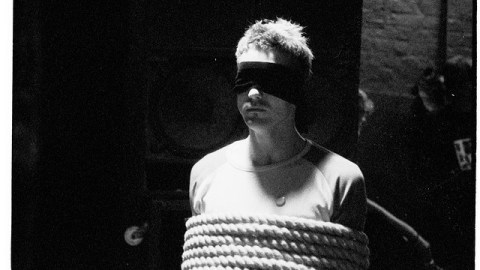Ultimate Survivor Stories (Part 2): Kidnapped in NYC

Few people have felt the muzzle of an automatic machine gun in their gut, let alone survived a kidnapping on their birthday. In January 1998, then-federal prosecutor Stanley Alpert was walking home through the streets of Manhattan, expecting to spend his evening celebrating his birthday with friends, when he was abducted by armed gunmen.
“They shoved me into the street and forced me into a waiting new Lexus sedan. In the car there was a third man; he stuck a pistol in my face,” explains Alpert in a harrowing Big Think interview. “They took me to a cash machine. They told me if I didn’t cooperate with them and give them my numbers… full cooperation or they would kill me.”
When Alpert’s kidnappers found he had a significant amount of money in his savings account, they took him to an apartment in Brooklyn, where they repeatedly threatened to take his life. “They told me they could pull the trigger and blow my brains out if they chose to. They also said that if I didn’t cooperate with them in the morning by going with them to the bank and helping them get my savings, that they would go to my father’s apartment and murder him by breaking every bone in his body.”
In the second installment of Big Think’s Ultimate Survival Stories series, Alpert recounts what went on to be a 25-hour “macabre comedy” in which his captors offered him drugs and sex, while intermittently continuing to threaten his life.
Once Alpert was finally released from captivity, FBI agents and NYPD detectives doubted the truth of his bizarre birthday kidnapping until evidence corroborating his story began to add up: “I didn’t know it at the time, but I found out much later that after they heard the story, they actually went outside and said, ‘That story is the biggest pile of crap we ever heard’ because it didn’t add up for them,” says Alpert. “Who gets kidnapped on his birthday, offered sexual favors, offered marijuana, almost a party that went on in the room, and who walks out alive? It’s very unusual.”
Though all the FBI agents and NYPD detectives agreed that he was lucky to have lived, Alpert says there a few strategies and techniques—some of which are mentioned by survival expert Laurence Gonzales in the first installment of the Survival Stories series—that he employed to help his chances of surviving the kidnapping. “First of all, I stayed very calm. I stopped, I thought, I listened. I didn’t do anything without calculating the power and the import of my words,” he says. “Also, give up your ego. Give up who you were. I was a Federal Prosecutor, in that position I had considerable power. In this position I was in, I had no power at all except the power of my wits, which I tried to get by with. But understand that you’re no longer who you were in the situation and adjust to that. So that’s another principle I would say for survival is to be very flexible.”
Another strategy that Alpert employed was maintain his sense of empowerment over seemingly minor details of his situation. When his captors invited him to take his shoes off, he respectfully declined to maintain a promise with himself that sooner or later he’d walk away from captivity alive. When his captors called him by the wrong name, he felt it was important to correct them in order to assert his identity. “My identity was my life. If I’m a real person with a real name, then you’re less likely to kill me and so I maintained that bit of control,” says Alpert. “I think that’s also – to feel a sense of some empowerment. And if you read the studies of Post Traumatic Stress Disorder, what they say is that people get Post Traumatic Stress Disorder because they felt a complete disempowerment. They felt a complete lack of control. I was in a situation that was out of my control for the most part, but where I could find I used it.”
In hostage situations, Alpert also says it is crucial to humanize yourself to your captors. If your captors view your not merely as a target, but as a human being, then their is stronger incentive for them to keep you alive. Alpert says he conveyed his humanity through small details. For instance, when one of his captors asked about the gold watch he was wearing, he explained that the watch was a gift that his father had given him for graduating law school, thereby reminding his captors of his family.
Ironically enough, Alpert, then an Assistant District Attorney, was also able to showcase his humanity by providing his captors with legal advice. “They asked me actually some very serious legal questions. One of them was about how one of the guys had been, what he claimed, falsely arrested and he wanted to know if he could bring a lawsuit even though he had given a false name to the police,” explains Alpert. “Now you can imagine a Federal Prosecutor is not in a position to assist somebody who has given a false name to the police. But I was struggling for my life. So I asked a lot of questions, found out the facts and then I gave him a legal theory by which he might be able to win. I said, ‘Well,’ you know, ‘You could say the reason you gave the false name was that you felt frightened by the police themselves because they had falsely arrested you.’ Now I give you this, this is definitely not one of my prouder moments. And as a Federal Prosecutor, I would never try to manipulate something in that way, but here I was just trying to hold onto my life.”
Aside from a city-wide sweep led arm-in-arm by NYPD and FBI agents that led to his captors’ arrest, Alpert says the sense of community his family and colleagues provided him after the event helped stave-off the psychological effects of his traumatic experience. He also says he was able to purge the negative experience by writing it down, once and for all, in his book, The Birthday Party, a Memoir of Survival. I decided to dedicate the energy from this negative experience. Alpert says the book helped him give thanks and credit to the law enforcement officers who might not have saved him physically, but who “saved him psychologically, by rounding up the criminals within 48 hours after he’d been released from captivity. “That gave me peace,” he says. “I could walk the street and know that these guys weren’t out there doing to someone else.”
Not all of the participants featured in Big Think’s Ultimate Survival Stories walked away from their experiences physically unscathed. Check back tomorrow for Guardian Angels founder Curtis Sliwa’s terrifying tale of being at the wrong end of a mafia hit, and visit us on Friday to hear about how journalist Jere Van Dyk survived for 45 days as a captive of the Taliban in Afghanistan.





